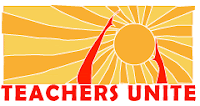
As previously posted here, Sally Lee of Teachers Unite, hosted a forum on UFT basics aimed at new teachers, a number of whom enter teaching with a negative attitude about the UFT and unions in general. They are going to rescue the schools from those burned out teachers who value the contract over the children. Many have been imbued with the "corporate is good, public institutions are bad" mentality from college or previous jobs.
After all, look at the massive propaganda machine in the media that blame teachers for all the problems in the schools. With the DOE pointing its finger directly at the union contract as a reason for failing schools and with the DOE's ability to capture Teaching Fellows and Teach for America teachers with a "stay away from the union" and "you will find union people who don't want to work" and "UFT Chapter Leaders are the worst teachers" propaganda blitz, there is a lot of work to do.
At the same time, a group of these teachers are socially conscious and looking to be politically active in social justice areas. Sally's idea was to bring veteran union activists like myself and Megan Behrent (just a little bit less vet than I am) together with some of these people to explain how we see the union operating from our perspective, as members of ICE and TJC. If people want to get the Unity/union leadership point of view, they can always read the NY teacher, watch the commercials, or go to chapter meetings when the suits come to the school. But these are the people who often turn them off.
The event, surprisingly, brought out a mixed group of newer teachers and vets, some of whom read about it on this blog, including someone from Unity (not from the leadership.) We think everyone got something out of it. It was a pleasure working with Megan, who is so knowledgeable and articulate in presenting her views and that of TJC. She combines practical experience with her theories of activism. In particular, Megan is so good at addressing the idea that teachers who insist on adhering to the contract or who don't put in 12 hour days as somehow not being as caring as teachers that do. Points were raised that none of these 12-hour a day teachers have families with children or have to commute and that when they do they will find it impossible to put in the same time. In some ways, the concept of "heroic teacher saving the children," the Klein/corporate model of the ideal teacher, is very anti-mother (I know that many fathers take a big share of child-caring, but let's face it, women still bear the brunt). Lost in the rancor of the last few contracts with its time extensions was the disruptions so many families went through with rearranged baby sitting, etcc.
Sally has been bugging me for years to put together a flow chart of how the UFT is organized and I finally did it as well as a chart of the various caucuses. I used them to present a section on "UFT Basics 101." I will ultimately post them both when they are more presentable for the web.
Here is Sally's outline we worked from. We got most of this done, but not all.
Getting to Know the UFT: An Introduction for Teacher Activists
March 1st, 5:30 p.m., Brecht Forum
Overview of UFT Structure and History (15 min.)
(Sally) [slide presentation]
• Radical history
-What did Teachers Union fight for?
• 1968 strike
-Teachers vs. Community
• 2006 Context
-Community perception of UFT
-UFT’s role in national politics (Beyond Contracts)
(Megan)-Purpose of labor unions: Current State of solidarity/labor movement
(including: How TFA/Fellows program break solidarity)
(Norm) -How UFT is structured (hierarchy, caucuses, how resolutions are passed, etc.—
Why Get Involved (and what may happen if you do, and how to do it)? (20 min.)
(Norm/Megan) •Individualistic set-up of teaching (the “Dangerous Minds”/”Freedom Writers” trap): “I can make a difference” vs. building a broad movement
• Rank and file involvement/democracy makes the UFT stronger (including: how this will affect community/social justice issues)
(Sally) • Social Justice Unionism
(Norm/Megan) • Risks and Advantages of getting involved with the union in a school
(including the content of what you teach)
(Norm/Megan) • How can rank and filers get involved?/How can rank and filers utilize union as an organizing strategy for social justice?
-Rep/Delegate
-Caucuses
-Voting
-Chapters endorsing particular issues
-Conduct outreach about issues at DA meetings
• Strategies for protection
(Megan) -Consultation Committee
(Norm) -Customized consultation committee
Know Your Rights! (10 min.)
(Norm) • Role of chapter leaders
• Typical abuses/typical grievances
• Resources: Where can individuals look up rights?
Q & A (30 min.)
Participant questions for veteran union activists (introduce any union activists who are present to answer questions).
No comments:
Post a Comment